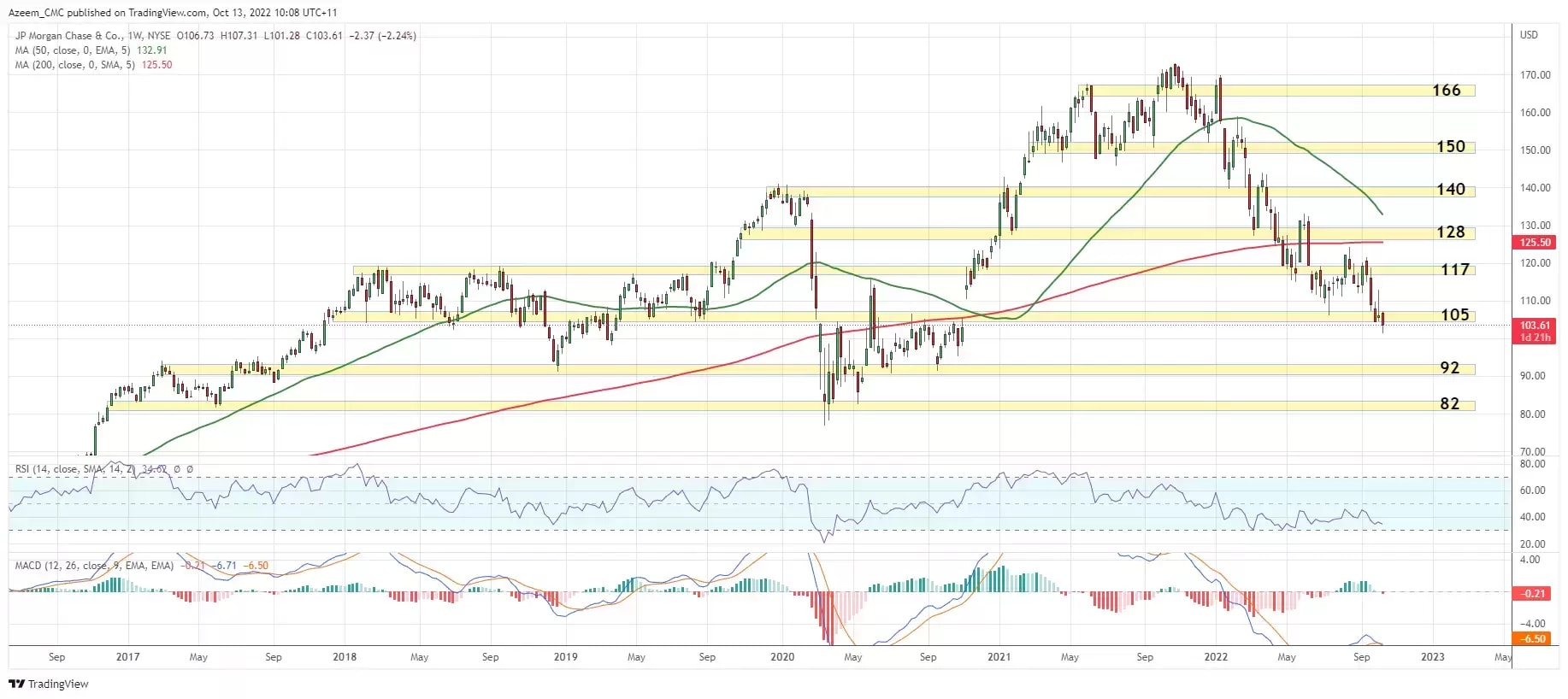The article is provided by Tina Teng & Azeem Sheriff, Markets Analyst, CMC Markets APAC & Canada
The US third-quarter earnings season will kick off with major banks piloting the company’s performance this week. JPMorgan Chase & Co, Wells Fargo & Co, Citigroup Inc, and Morgan Stanley will all report their Q3 performance before the US market opens on Friday, 14 October. In a bleak economic backdrop, US bond yield’s inversion certainly hurts bank earnings. But rising rates may have helped to increase their profit margin in lending, despite a slowdown in mortgage activities, investment banking and trading. According to Refinitiv, a drop of 25% in earnings on average is expected of the four banks, which account for 67% of assets in the Global Systemically Important Banks (GSIB). But an outperformance in an already lowered expectation usually leads to a rebound in these beaten-up bank stocks. In this article, we focus on the largest investment bank, JPMorgan Chase, to preview its third-quarter results, along with a summary of Citigroup.
Earnings may continue to drop in JP Morgan Chase & Co.
JPMorgan’s commercial banking business may stay strong as an increase in profit margins, and loan volumes are offsetting slowdowns in mortgages and funding costs, which points to an improved profit margin in interest income in the third quarter. According to Bloomberg, JP Morgan Chase’s earnings per share for the third quarter is at $2.88, a 23% drop from a year ago but a slight improvement from the second quarter’s earnings of $2.76. The revenue is forecasted at $31.99 billion, an 8% growth compared with the same quarter last year, and a 1% increase from the previous quarter. In general, the bank’s net income and sales revenue are expected to improve marginally from the second quarter.
However, the investment banking business may remain weak in growth due to a slowdown in IPOs and company deals amid macro headwinds. The COO, Daniel Pinto, expected investment banking fees would drop 50% annually in the third quarter, following a 60% fall in the second quarter. The bank also increased the rainy-day funds by $1.1 billion from $1.5 billion in the first quarter to cover the risks of credit default, suggesting that rising rates and economic headwinds have increased banks’ risks in terms of bad debts.
In general, JPMorgan’s result may not be as bad as previously projected, and a surprise in earnings could always offer a rebound opportunity for the world’s largest investment bank.
A decline in both earnings and revenue growth is expected for Citigroup
Citigroup beat earnings expectations in a big way in its second-quarter earnings, with EPS at $2.30 vs. the $1.67 estimated. According to Zacks Consensus, the bank’s third-quarter earnings per share will be at $1.59, a 26% drop from a year ago. Revenue is expected to be $18.46 billion, an increase of 7.6% year on year but down from $19.6 billion in the second quarter. The consensus suggests that the bank may not perform as strong as in the prior quarter. The bank also set aside $1.3 billion for its rainy-day credit losses.
Apart from the earnings reports, the banks’ future guidance will be in focus for investors to navigate the growth trajectory of this sector. The hefty inflation and signs of growing unemployment, the slowdown in spending and borrowing may still be the roadblock to the banking sector. The argument will be if the 40-50% year-to-date drop in bank stocks is already priced in the downturn and if the selloff has been overdone. Will there be a better prospect in the fourth quarter if central banks start turning soft in their rate hike path?
Disclaimer: CMC Markets is an order execution-only service. The material (whether or not it states any opinions) is for general information purposes only, and does not take into account your personal circumstances or objectives. Nothing in this material is (or should be considered to be) financial, investment or other advice on which reliance should be placed. No opinion given in the material constitutes a recommendation by CMC Markets or the author that any particular investment, security, transaction or investment strategy is suitable for any specific person. The material has not been prepared in accordance with legal requirements designed to promote the independence of investment research. Although we are not specifically prevented from dealing before providing this material, we do not seek to take advantage of the material prior to its dissemination.









